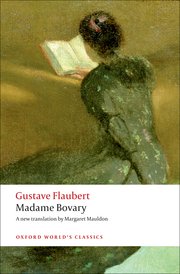
Mauldon Translation
I read Madame Bovary in high school, in French, which is to say, I didn’t read it. What I did was spend many hours with a French-to-English dictionary. I was eager to read it as an adult, this time in English.
The classic novel is a slow story by modern standards. Country girl Emma, daughter of a pig farmer, is married off to a country doctor, Charles, where she achieves a comfortable life. But she dreams of luxury and fine clothing, food and furniture, dancing all night, and above all, she dreams of romance. Charles is boring as dirt.
Bored to death, she embarks upon a series of affairs, during which she spends her husband’s money extravagantly, leading inevitably to disaster for them both. The novel was scandalous in its time (1856), of course.
It is difficult to understand the psychology of country folks in Normandy a hundred and fifty years ago. One of the enjoyments of the novel is the insight Flaubert provides into that, although it is impossible for me to know, without considerable research that I am not willing to do, what parts are real and what parts are fantasy.
For example, Charles has to be the most dimwitted cuckold in all of history. Even a dog could see that Emma was fooling around. Could the taboos against adultery in country life have been so rigid as to make it unthinkable and invisible? I doubt it. Adultery has been going on for a very long time in all civilizations, in all classes, in all species. So Charles’s ignorance seems improbable. Toward the end, when the evidence is overwhelming, he sort of chooses to not understand, which is slightly more believable.
And what of Emma? Could there really be such an empty-headed, unsocialized, untutored woman so possessed of childhood fantasies? Maybe. Women were, as a cultural practice, untutored and badly socialized, and the only child of a pig farmer would have had limited opportunity for psychological development. Still, it is hard to believe that as an adult Emma could be so utterly bored and self-centered, especially since she is presented as articulate, literate, witty, and talented in music, sewing, and finance. So she is not believable either.
Add those two ciphers together and you get… nothing believable. The novel mechanically plods to its inexorable conclusion but I never was engaged with the characters.
The story is presented with mud-on-the-boots realism, so there is plenty of insight into everyday life, which I appreciated in the well-annotated Oxford edition that explained almost every reference to obscure practices, foods, religious ceremonies, medical procedures and news articles. All that helped in getting a clear glimpse into lives in another century.
Mauldon’s translation, while perhaps not as lyrical as Lydia Davis’s more celebrated one, is good on rendering the sweat and roughness of everyday life in simple and coarse terms, also contributing to a compelling sense of seeing life as lived on the ground in that time and place. I enjoyed that quite a bit.
Finally, I admired Flaubert’s craftsmanship. It is often said that he invented the modern novel and that could be right. He supposedly did invent the narrative technique of free indirect discourse (FID) wherein a third-person-close narrator temporarily dips into first-person voice to express the mind of a character.
I think the first official use of FID in the modern novel in 1856, occurs on page 11, describing Charles’s boyhood. He’s walking along the banks of the river, experiencing the great outdoors:
“Opposite, above the rooftops, he could see the vast, pure sky, and the red sun setting. How wonderful to be in the country!”
The first sentence is from the third-person narrator, but who gives voice to the second sentence? It’s a blend of narrator and Charles himself, and there it is, the historical moment of the invention of FID.
I also appreciated Flaubert’s detailed descriptions of the environment.
“The ballroom was stifling; the lamps were growing dim. People were moving out into the billiard room. A servant climbed onto a chair and broke a couple of panes; at the sound of the shattering glass, Madame Bovary looked round and saw, in the garden, pressed against the window panes, the faces of peasants, staring in.” (p. 47)
I can experience that. It’s detailed, sensory writing, enjoyable and admirable.
Overall then, the book has many fine qualities that make it a deserved classic, even if strong character and plot are not among them.

People are bored and blind like this all day every day.